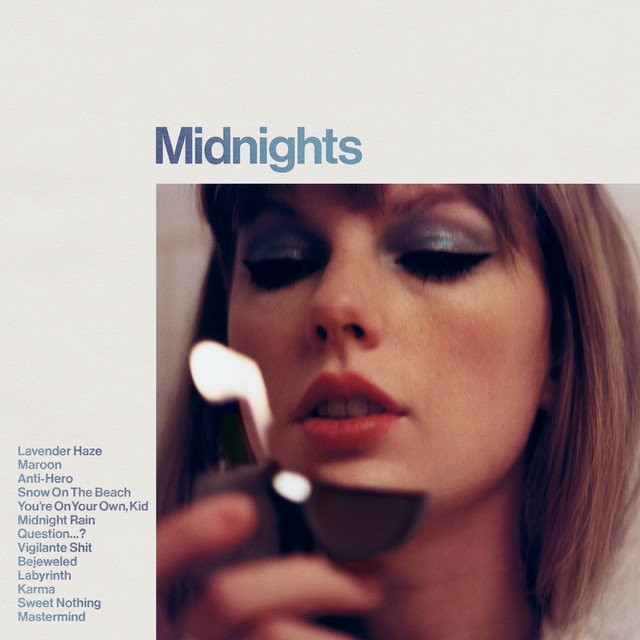In Defense of Taylor Swift’s ‘Karma’
Since releasing her eponymous debut album in 2006, Taylor Swift has consistently differentiated herself from her peers through her writing. In her 2019 documentary Miss Americana, she expressed her desire to maintain her “her sharp pen, thin skin, and open heart.” With the release of “All Too Well (10 Minute Version) (Taylor’s Version) (From the Vault),” she cemented herself as a songwriting icon, although that Song of the Year Grammy remains her white whale. So, what does her newest LP, Midnights, offer us? A whole lot of “Karma.”
In the weeks preceding the release of Midnights, Swift spent some time dividing her songwriting into three pen categories: quill, fountain, and glitter gel. To some, the categorization may seem innocuous, but it’s actually an excellent way to distinguish the different ways that she approaches her craft. Her Songwriter of the Decade acceptance speech at the 2022 Nashville Songwriter Awards offered further insight.
Taylor’s “quill pen” songs contain lyrics with “antiquated” words or phrases. These songs are seemingly ripped from a time when everyone wore corsets and walked with parasols to protect their skin from the sun. In these tracks, Swift typically pulls inspiration from the authors of old such as Charlotte Bronte or Jane Austen. Both of her 2020 albums, folklore and evermore, were stacked to the brim with these songs. Think of lyrics like “now you hang from my lips like the Gardens of Babylon” (“cowboy like me,” evermore) or “your faithless love’s the only hoax I believe in” (“hoax,” folklore).
“Fountain pen” songs are tracks that find Taylor painting vivid pictures or memories. Often, she will take a common phrase and flip the meaning: “I have been borrowed and you have been blue / all’s well that ends well to end up with you” from 2019’s “Lover” or “All the kings’ horses, all the king’s men couldn’t put me back together again” from “The Archer,” also from 2019. Typically, these are personal and, at times, autobiographical songs; they feel as though they were ripped from Taylor’s diary, or, better yet, from the diaries of young people around the world. These are the songs that shot Taylor to fame. Think of “Love Story,” “White Horse,” and the beloved “All Too Well” in all of its different versions.
Finally, there are the “glittery gel pen” songs. Criticism and controversy often accompany these tracks. According to Taylor, these lyrics are to remind people to have fun! The players are gonna play and the haters are gonna hate! You aren’t going to take them seriously, and you aren’t necessarily supposed to. Midnights has its fair share of glittery gel pen songs; their lyrics almost invite the audience to hate on her. It’s almost as if she wants her fans to be fighting for their lives. (Ask any Swiftie what they went through when “ME!” was released). Karma, track 11 on Midnights, might be the exception that proves the rule.
Republic
When Taylor announced the title of Track 11 in her “Midnights Mayhem with Me” TikTok series, she ended the video with a self-aware giggle. For the uninitiated, “karma” is also the title of a scrapped album believed by some fans to have been recorded in the time between reputation and Lover. Swift herself has never truly fed into these theories, (though, at one of her Lover secret sessions, she allegedly told some fans that she had no plans after reputation). Nonetheless, Taylor knew what she was doing when she announced the track’s title.
With lyrics like “karma is my boyfriend” and “karma is a cat,” “Karma” appears to be stupid at best and awful at worst. A far cry from what should be the standard for such a lauded songwriter. However, after sitting with the song, I have concluded that “Karma” is actually a deft display of skill.
“You’re talking shit for the hell of it,” Taylor croons at the beginning of “Karma,” before noting the betrayal this person has enacted on those who have tried to help them. This “you” is “terrified to look down” because they have climbed to the very top of their mountain by stepping on everyone else. This person is not ready to truly see just how much they have hurt people. It is here that one might expect Taylor to launch into a vengeful reputation-esque rant about whoever this “you” is. This would not be an unfounded expectation as Taylor has stated that her revenge fantasies were some of her influences while crafting Midnights.
On “Karma,” Taylor takes the general connotation of the word and flips it on its head. Based on the Merriam-Webster definition of the word, “karma” is defined as “a force considered as affecting the events of one's life.” Karma is commonly understood as when something unfortunate happens to people who have wronged you. Swift reverses that idea. This “revenge” song is simply about how happy she is. Taylor Swift is always at her best when she’s singing with a sly wink. For Taylor, the best revenge is for those who wronged her to see her doing well. It’s the second-best not-humble brag on the album, right behind “Bejeweled.” There is no reason that karma cannot go both ways. Everyone who has hurt her has to watch her succeed. She “keeps her side of the street clean,” so she gets all the good things. A man who loves her, cats, vacations — she’s living her best life! Meanwhile, for the person (or people) who hurt her, things aren’t so hot.
Don’t let the levity of the chorus overshadow some of the clever lyrical moments elsewhere in the song. The entire second verse is terrific: “Spider boy, king of thieves / Weave your little webs of opacity / My pennies made your crown.” The subject of this song is not on Taylor’s level in any capacity. They are a spiderboy, not grown enough to be considered a man, and a king, but only of thieves. The webs he weaves and the lies he tells are dull and obscure. She then goes on to say that her pennies, the ones he stole from her, made him the king. He would not be in his current position without her scraps. This can also be viewed as Taylor saying that the object of her ire would see her scraps as something golden and worthy because he’s never known anything shinier than a single penny.
“Karma” also contains a popular Swiftism — Taylor’s penchant for inverting common literary devices. By doing this she takes what the audience expects to hear, and subverts that expectation with something new. In “Karma,” she sings, “Trick me once, trick me twice.” We, the audience, are familiar with this rhyme: Trick me once shame on you, trick me twice shame on me. Taylor does not need to waste lines by finishing the refrain because she knows that we’ll understand how the idiom ends. She is also implying that she understands that she shoulders some of the fault in this situation. She continues the line with “don't you know that cash ain't the only price? / It's coming back around.” In the midst of her shame, Taylor has paid whatever price she needed to, while her hater(s) haven’t. In exchange for her payment and her acceptance of some fault, “it,” or “karma,” is coming back around and gifting her with the good things in life.
“Karma” isn’t without its share of barbs. While Taylor is listing how good her life is, she slides in some quick jabs: “Karma’s a relaxing thought / aren’t you envious that for you it’s not.” All of her success weighs her detractor down so heavily that they can no longer have a relaxing thought. Karma is relentlessly “rattling [their] ground” and “tracking [them] down.” For example, with each album Taylor re-records, in addition to recentering the universal struggle for artists’ ownership of their work, she has been able to devalue her original master recordings — a catalog that Scooter Braun sold for a whopping $300 million.
By the time Taylor reaches the bridge, she begs to be questioned about how karma has treated her. She’s itching to reveal what she received from her “years” of hard work and the “tears” that she has cried. “Ask me why so many fade, but I'm still here,” she sings. While many of the peers Taylor came up with fizzled out in the streaming era, she just notched the fast-selling album of her 15-year career with Midnights. What’s more? The success of Midnights resulted in Taylor simultaneously holding the top 10 spots of the Billboard Hot 100. She’s the first and only artist in history to achieve such a feat. Simply put, Taylor and karma are besties, and “Karma” is their friendship anthem.
Vote for Taylor Swift at the 2023 Bulletin Awards.







Every “From The Vault” tack from Speak Now (Taylor’s Version), reviewed and ranked.